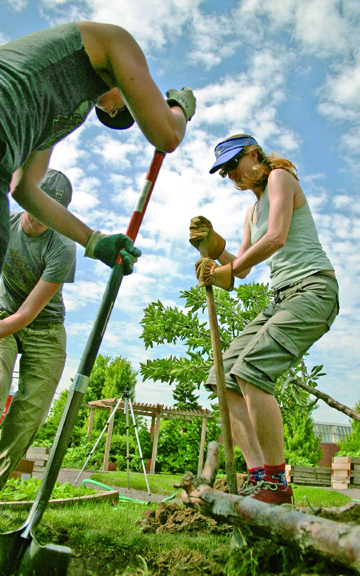
by Mark Smiley | Aug 29, 2014 | General Featured
Rules Hatched By City Council Also Allow Homegrown Sales In Kitchens, Yards Until Dusk
by Glen Richardson
Have you heard the buzz?
If not, step into your backyard and listen for the hum of bees. If you pay close attention you may also hear the sounds of chickens, ducks and goats! They’re some of the reverberations to expect as the Cherry Creek Valley rototills into full-fledged backyard farming. What’s more, anticipate that your street will also become one big Farmers’ Market as neighbors begin to sell their farm produce in their kitchens and from their front yards.
In July the Denver City Council approved a new law that allows residents to both raise and sell fresh produce they have grown themselves and “cottage foods” such as jams and honey they have made themselves in their home kitchens. Under the new law which took effect July 18, residents are required to purchase a permit but then will be able to sel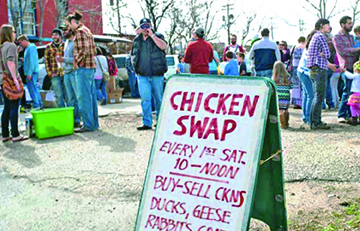 l from home raw and uncut fresh fruit, vegetables and herbs that were grown by the seller either on site or in a community garden.
l from home raw and uncut fresh fruit, vegetables and herbs that were grown by the seller either on site or in a community garden.
City Farming Rules
Urban farmers will now be able to sell whole eggs produced by chickens or ducks kept by the seller at home or as un-refrigerated food products made on-site such as spices, teas, honey, jams and certain baked goods made themselves in their home kitchens. Under the law people can sell from inside or outside their home from 8 a.m. to dusk and can sell up to $5,000 worth of goods and produce a year.
The city requires that urban farmers apply for licenses to sell their food. The city charges a one-time fee of $20 for the license. Urban farmers setting up indoor or outdoor farmer markets are not required to provide parking spaces. No sales tax is required and the seller determines the sales prices. For neighborhood farmer markets only temporary, portable furniture is allowed — tables, stands and umbrellas — for outdoor sales and they must be taken inside between dusk and 8 a.m. daily. Signs for home sales must be flat, attached to a wall or window of the home, and cannot be more than 100 square inches in size. One sign is allowed per street front (one sign for most lots, two signs for a corner lot). No moving signs and no lit sign(s) are allowed.
Several city restaurants currently grow produce in gardens and farms they own and sell them in their local eateries. Now those plus other restaurants that don’t have gardens and farms will be able to buy vegetables, eggs, jams, and fruits being grown in the neighborhood by backyard farmers.
Hatching Big Ideas
As the backyard chicken craze spreads like wildfire it’s beginning to seem like the chicken coop is the new doghouse. Increasingly Valley fidos will have to share the yard with the ladies. But before getting in a flap with your pup be aware that sales of whole, fresh chicken eggs are limited to less than 250 dozen per month.
According to rules hatched by the city, egg cartons must include the origin of the eggs and the packing date. Unless the eggs were treated to prevent salmonella, the label must include safe handling instructions: To prevent illness from bacteria, keep eggs refrigerated, cook eggs until yolks are firm, and cook any foods containing eggs thoroughly. Cartons must be labeled: “These eggs do not come from a government-approved source.”
Eggs, produce and other products sold by urban farmers must have a label and be traceable to the seller. Labels must list the name of the product, the producer’s name address, telephone number and email. Items must also include where the food was prepared or grown, the date the food was produced and a complete list of ingredients. If a product was produced in a home kitchen that is not subject to state licensure or inspection and that may also list common food allergens such as tree nuts, peanuts, eggs, soy, wheat, milk, fish and crustacean shellfish, labels should read: This product is not intended for resale.
Who’s Digging In?
Who are these upstart urban farmers with enthusiasm for having dirt under their finger nails, bees and chickens in their backyard, and fresh food in their bellies? It’s locals like Brenna Brooks-Larson, a Valley elementary school teacher who helped launch Celebration Community Farm in the Virginia Village neighborhood on the corner of Iowa and Birch. She grew up in Denver and is now a board member of UrbiCulture Community Farms. Her love for farming began in Nicaragua as a Peace Corps volunteer where she managed three school gardens. Or gardening volunteers like Maggie Rice, the second woman in Colorado to become a Certified Working Chef. She is building a Permaculture Institute on 1.5 acres 10 minutes from downtown Denver.
Also among the back-to the-land group is James Bertini, a lawyer turned farmer whose backyard on Fourth Ave. and Kalamath has chickens, rabbits and a garden plot. His interest in farming began with his wife Irena’s dissatisfaction with the prevalence of processed foods. The pair own and operate Denver Urban Homesteading — a year-round farmers market on Santa Fe — selling locally grown produce and foodstuffs. A horde of backyard farmers can be found buying chickens, rabbits and other backyard critters at a livestock exchange sponsored by the couple each month.
Many like Jason Plotkin — Farm Manager at Lowry’s Ekar Farm & Community Garden — got into farming to help neighbors and society in general. The farm hosts 50 community garden plots within the diverse Lowry neighborhood. Ekar engages 1,000 community volunteers in growing 25,000 pounds of urban organic vegetables. The farm donated 85 percent of the vegetables grown — with a market value of $95,000 — to Jewish Family Service, Weinberg Food Pantry and other food relief agencies that feed 2,500 people a month during the harvest season.
Cultivating Change
The Valley’s backyard farming boom began more than 25 years ago when the nonprofit Denver Urban Gardens (DUG) began working with the community to build and support gardening. The organization currently organizes and manages well over 100 community gardens, including 35 at Valley schools. By 1993, DUG was coordinating 21 local gardens, and by 1997, 32 new gardens and DeLaney Community Farm were established. Within the past decade it has created multiple ongoing youth and community education programs designed to assist community involvement and long-term garden sustainability.
Another significant backyard farming venture is the community farm at Valley-based Denver Green School, run by Sprout City Farms. It is a one-acre organic farm located along East Virginia Ave. Produce from the farm is used for the school salad bar as well as in cooked meals for about seven out of the nine months during the school year. The farm is able to meet nearly all the produce needs for the school kitchen from August to October. Sprout Farms believes the future of urban agriculture requires a shift in thinking, eating and acting.
Even the city has gotten into the backyard-farming act with a plot on the grounds of the Colorado Convention Center. Known as Blue Bear Farm, the 5,000-square-foot farm is located on the sunny south side of the convention building. Beds bloom with crops of fresh fruits, vegetables and herbs that are used by Centerplate chefs at the Convention Center. Basil, beans, peppers and parsnips plus radishes and raspberries are among crops grown. The farm has two beehives providing fresh honey to convention attendees.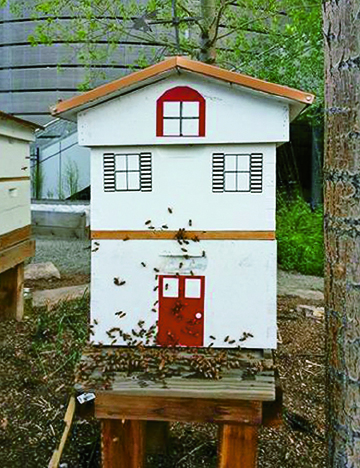
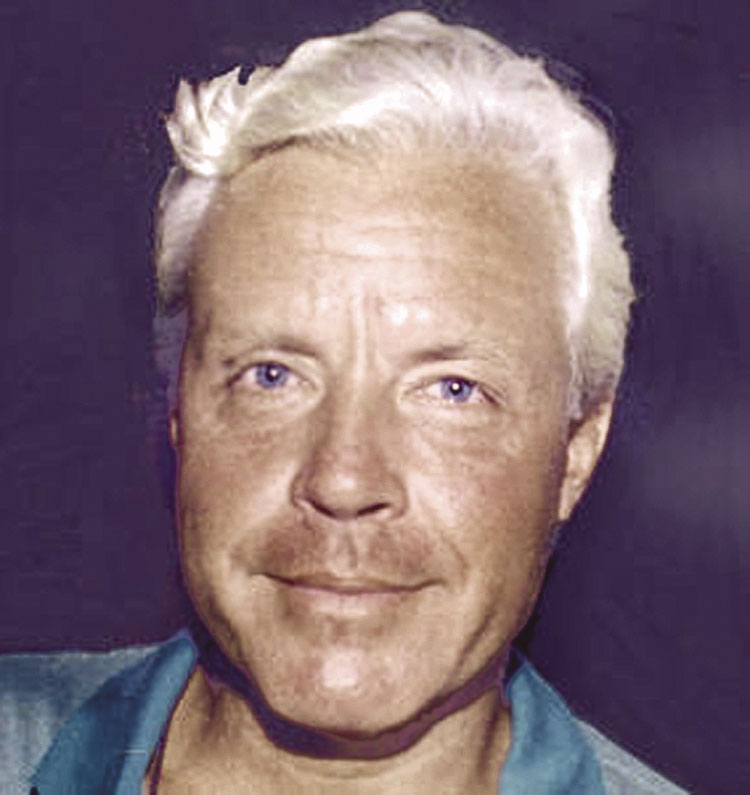
by Mark Smiley | Aug 1, 2014 | General Featured
by James Bowie
Former Glendale City Manager Veggo Frederick Larsen II died at age 61 at his residence in Palmetto, Florida. The cause of death was not reported other than it was “unexpected.” He was city manager of Glendale in tumultuous times from October 1999 to May 2002. After leaving Glendale he joined a recycling firm in Texas. It does not appear that he was employed at the time of his death.
Larsen was born to a prominent family in Hamden, Connecticut, and was a graduate of the Wharton School of Business at the University of Pennsylvania. He had two brothers and two sisters. The sibling he was closest to, Eric Larsen, passed away several years ago. His grandfather and namesake, Veggo F. Larsen, was president of the Connecticut State Golf Association in 1956 and 1957 and helped to instill a love of the game of golf into his grandson. His father, Edwin Veggo Larsen, was a real estate developer and predeceased his son by less than two years. Prior to becoming the city manager of Glendale, Larsen was in the real estate business in Colorado and then the New York area.
In the spring of 1998 the Glendale businesses and residents formed a political group called the Glendale Tea Party and swept its slate of candidates to office in the City Council. That fall a new city manager was to be chosen. Chuck Bonniwell (publisher of the Glendale Cherry Creek Chronicle) was an old friend of Larsen and proposed him for city manager.
Larsen described his selection in an article in Westword concerning the initial get-together of the six city manager candidates and city officials: “When Chuck’s girlfriend shows up and gives me a big hug. Oh, they knew. They knew there was a rat in the woodpile — they just didn’t know which one.”
Bonniwell’s remembrance of the event was somewhat different. “I supported him along with a majority of the City Council. They were not really any hidden agendas. He was the leading candidate for the city manager position, but he certainly could have unimpressed the council members in which case they would have chosen someone else. Veggo always had a wonderful way of making the mundane seem very fun and dramatic.”
Larsen later led a highly publicized revolt against his original supporters. In 2002 Bonniwell and other members of the Glendale Tea Party supported a new set of candidates who prevailed at the ballot box in 2002 and fired Larsen. Bonniwell noted, “Veggo was an immensely engaging and intelligent individual who could have been an extraordinary city manager in Glendale or anywhere else. But he never wanted to be beholden to anyone, which is fine, but in the end it meant he never worked for or with anyone for very long. He had a job he could have retired at many years later. Instead he was on the street once again looking for employment after just three plus years.”
Former Glendale Mayor Mark Smiley remembers Larsen’s extraordinary gift with words, “He was a National Merit Scholar in high school and was always making up palindromes [words or sentences read the same forward or backward, i.e. civic] when he got bored at City Council meetings. He could be wonderfully fun.”
Present mayor of Glendale and Colorado gubernatorial candidate Mike Dunafon remarked, “I always liked Veggo even after he stabbed everyone in the back. He had everything going for him, but could never quite put it all together. He was missing that piece that makes very talented people successful, which is to see things from more than one’s own limited perspective, no matter how bright you are.”
One of Larsen’s accomplishments while city manager of Glendale was to establish a relationship with the city of Playa del Carmen, Mexico, which became the official “Sister City” of Glendale in 2004. He got the then Glendale Fire Department to donate a fire engine, that the department was in the process of decommissioning, to Playa del Carmen. He even drove the truck down to the Mexican city, a distance of almost 1,700 miles.
Bonniwell summed up, “Veggo was a little like Andy Dufresne in the movie Shawshank Redemption with Playa del Carmen being his Zihuatanejo. Unfortunately, like all of us to a certain extent, the bars of his Shawshank Penitentiary were imposed on him by his own mind. Unlike Andy Dufresne he never really escaped that self imposed prison.”
Larsen left 75 percent of his estate to the “Make a Wish” Foundation.

by Mark Smiley | Jun 20, 2014 | General Featured
 Ben Todd’s Business Pitch Scores
Ben Todd’s Business Pitch Scores
by Kirsten Kreiling
Benjamin Todd — a 5-ft., 11-inch, 210 lb. flanker for the Glendale Raptors rugby team — has scored on his first try. Not in a rugby game where grounding the ball in the in-goal area is known as a try, but rather when ABC TV’s hit reality show Shark Tank held a casting call at Infinity Park May 30.
More than 200 entrepreneur hopefuls came to Infinity Park to give their pitch at the site where the rugby playing field is also known as a pitch. To score in this competition contestants were given only 60-seconds to try for a winning pitch to producers. The show that was renewed for a fifth season in 2013 features business pitches from aspiring entrepreneurs to a panel of six multimillionaire “sharks.” The sixth season will start this September.
For an infusion of cash in exchange for a stake in their business, contestants face long odds and multiple screenings to present their business concepts. Nevertheless, a few days after his first attempt at goal, Todd received an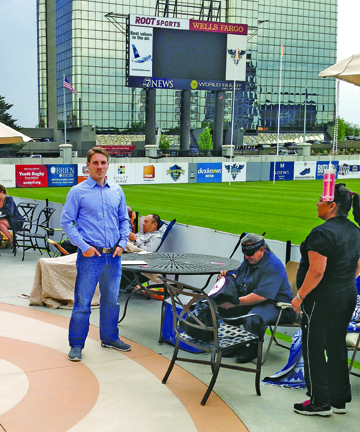 email divulging that he had scampered past 180 others and had made it to the second round. “I am so excited. I had to submit a 5-10 minute video to them by June 13. If the producers of the show like it, I’ll be invited to come and pitch to the Sharks for real,” he tells the Chronicle.
email divulging that he had scampered past 180 others and had made it to the second round. “I am so excited. I had to submit a 5-10 minute video to them by June 13. If the producers of the show like it, I’ll be invited to come and pitch to the Sharks for real,” he tells the Chronicle.
Sharp Shark Skills
“I’ve been watching Shark Tank since 2008. I remember the first time I saw it, I immediately knew that I wanted to pitch ideas to investors. I usually come up with about three new business ideas per week. I’ve had 27 jobs throughout my life,” Todd admits. One of my college mentors often said entrepreneurs have trouble working for other people because they keep coming up with better ways to do things, he recalls, “Some call it being a control freak, some call it marching to the beat of your own drum. I like to call myself terminally entrepreneurial.”
Todd jumped at the chance to participate in pitching his idea to the Shark Tank associate producers, taking the whole day off from work. He even brought donuts to the field for contestants that had arrived earlier than he did. “I was pumped and ready to go. I arrived at 7:30 a.m. and was nervous all morning, practicing my pitch-points. Then the producer came out and told everyone they would only get 60 seconds to give their pitch. We all freaked out. It was time to really hone in on what was important about our ideas.”
His winning pitch is for a business he has started calling Mobile Menu. It’s an iPhone app (Android as well) that allows the user to browse a restaurant’s menu visually with a full-screen professional photo of every single menu item. “It’s been well-received over the last four years,” he reveals. But, he adds, “I’ve decided it’s time to scale the business up and grow exponentially instead of one spot at a time.”
Mix Of Shark Bait
Start-up business contestants at the Infinity Park casting call — one of three locations selected for the nationwide search — presented a full gamut of products, including a disposable cardboard device that women can use to stand up and urinate, to a multi-temperature “barbecue booster,” and a cheerleader-training device. A Colorado Springs couple auditioned for their SALUS Natural Body Care, a business that has opened its first store in Manitou Springs. One enterprising entrepreneur even camped out at Infinity Park selling umbrellas for $20 each to the crowd, many who came unprepared for the light showers that fell in the morning.
“We were delighted to be asked to host the casting call for Shark Tank and looked at it as a wonderful opportunity to show off the Infinity Park campus,” says Infinity Park Event Center General Manager Bobbi Reed. “The ABC casting crew was wowed by the Event Center’s ballroom production technology and loved the Shark Tank logos that were ‘swimming’ around the ballroom.” She adds that the Stadium was the perfect site to stage the applicants as they waited to be called to the tank for their presentation.
Business owners who have appeared on the show say the exposure is invaluable, even without a shark’s offer to invest. Meg and Matt Meyer, owners of The Bear & The Rat in Denver, came away empty after appearing on Shark Tank in 2012. But when the episode about their business selling cool treats for dogs (an alternative to ice cream) aired for the third time in repeats, it caught the attention of some dog-loving investors in New York. After negotiations, the investors put $130,000 into the business to be used for salaries, marketing and distribution of the frozen goodies. “We doubled our sales last year, and I’m anticipating we will at least quadruple this year,” reports Meg Meyer. “The exposure is huge. Every time the episode airs, it’s in front of six to eight million people, which is pretty awesome.”
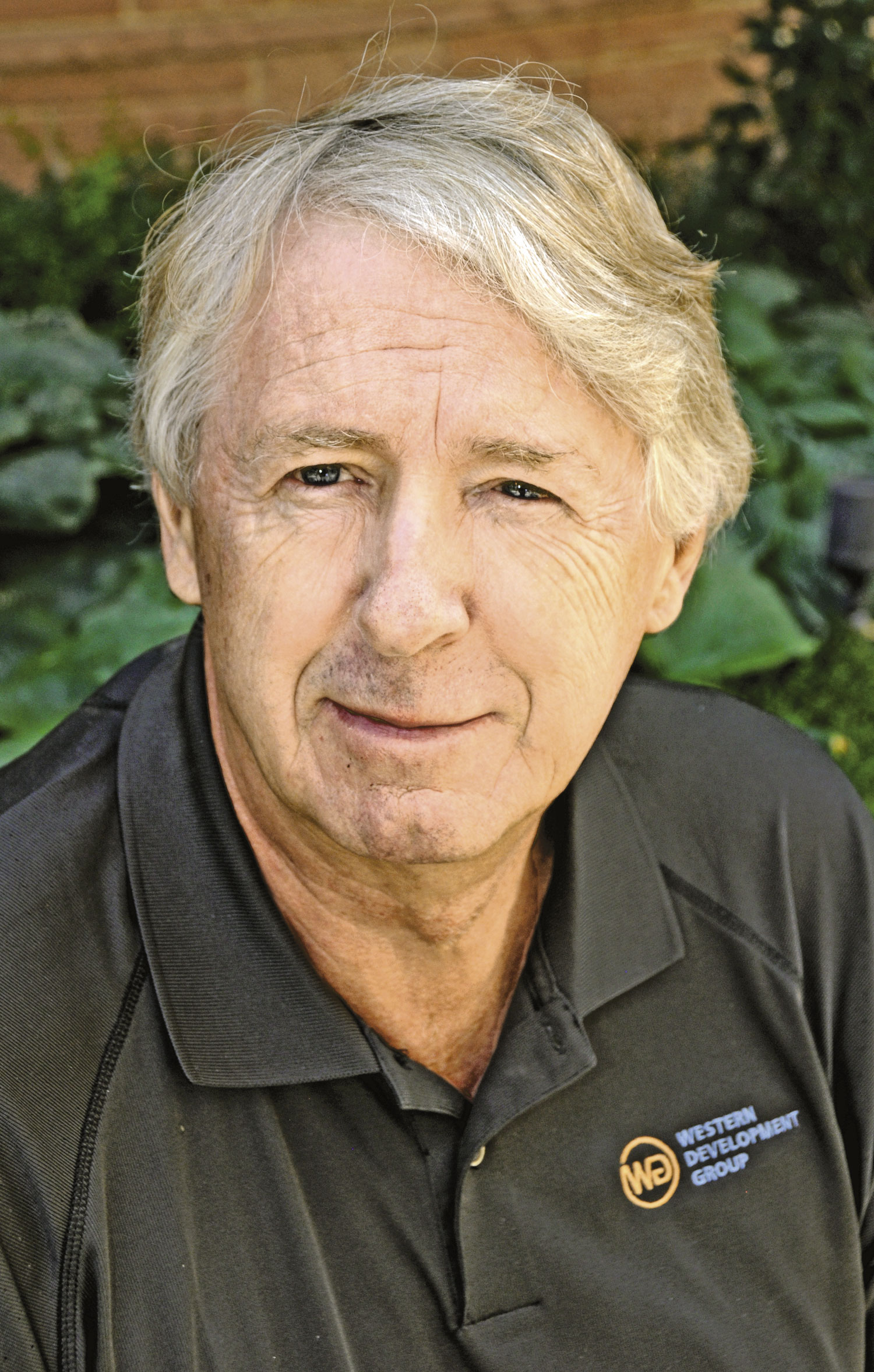
by Mark Smiley | May 28, 2014 | General Featured
by Charles C. Bonniwell
David Steel, President, Chief Operating Officer and Partner in Western Development Group, LLC, was presented the prestigious “Business Leader of the Year” by the Cherry Creek Chamber of Commerce at its annual luncheon on May 8, 2014, at the JW Marriott in Cherry Creek.
Western Development is a company capitalized by Philip Anschutz, the wealthiest man in Colorado according to Forbes magazine. The company built and developed the NorthCreek, a mixed use condominium project on Fillmore Street in Cherry Creek North. Units in the project sell for one million dollars o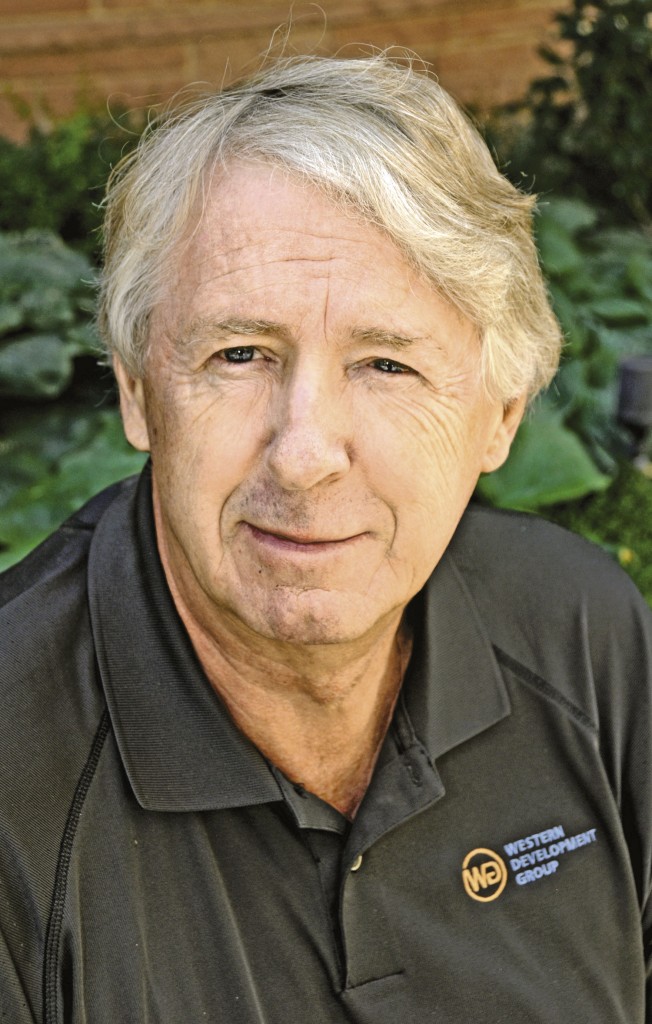 r more. Western Development is also in the process of building and developing 250 Columbine, a $100 million mixed use project and also in Cherry Creek North. Western Development will construct a seven story building that will have 71 luxury high end residences as well as retail stores on the ground level.
r more. Western Development is also in the process of building and developing 250 Columbine, a $100 million mixed use project and also in Cherry Creek North. Western Development will construct a seven story building that will have 71 luxury high end residences as well as retail stores on the ground level.
At the luncheon, Steel was praised for his “honesty and forthrightness.” He was also lauded for his work as past chair of the Cherry Creek North Business Improvement District as well as his work with the Cherry Creek Steering Committee and his role in founding the Cherry Creek Business Alliance. It was stated at the luncheon that Steel was “controversial on occasion” apparently referring to his leading role in turning the only open space in Cherry Creek North, Fillmore Plaza into a roadway in order to improve the traffic to the stores on the ground floor of the NorthCreek development. Attendees noted that while he was not always loved by businesses or residents for his role in the Fillmore Plaza destruction, he never hid or refused to talk to the public no matter how difficult some meetings were.”
“He is an incredibly upfront person,” noted Jeff Allen, COO of the Greater Glendale Chamber of Commerce, who was at the luncheon. “He never lies to people and doesn’t try to deceive anyone which are unusual traits for a developer in Colorado. Part of the reason he can be controversial is that while everyone else is hiding under the table, he stands tall and takes the shots. He is never unpleasant or angry no matter how heated the conversation gets. That is part of the reason why even his adversaries hold him in very high regard.”
The Cherry Creek Chamber head Christine Des Enfants called Steel one of the nicest, most professional businessman she has ever known.
In accepting the award Steel told the packed audience: “It has been a tough road, but worth it and we’re not done yet.”
Born in Canada, Steel started his business career in 1973 as a sales representative in Calgary for Xerox of Canada and held a similar position with IBM of Canada until shifting over to real estate in 1975. He came to Denver in the late 1970s with Oxford Development Group working on large scale, mixed use developments. He was hired by Philip Anschutz in 1983 and eventually became the President of Real Estate for The Anschutz Corporation. In 2004 he took over the reins of Western Development Group whose officers include Christian Anschutz, son of Philip Anschutz, who has a residence in NorthCreek.
Steel and his wife Cathy have been married for over 26 years, have two sons, and live in a home in the Country Club area adjacent to Cherry Creek North.
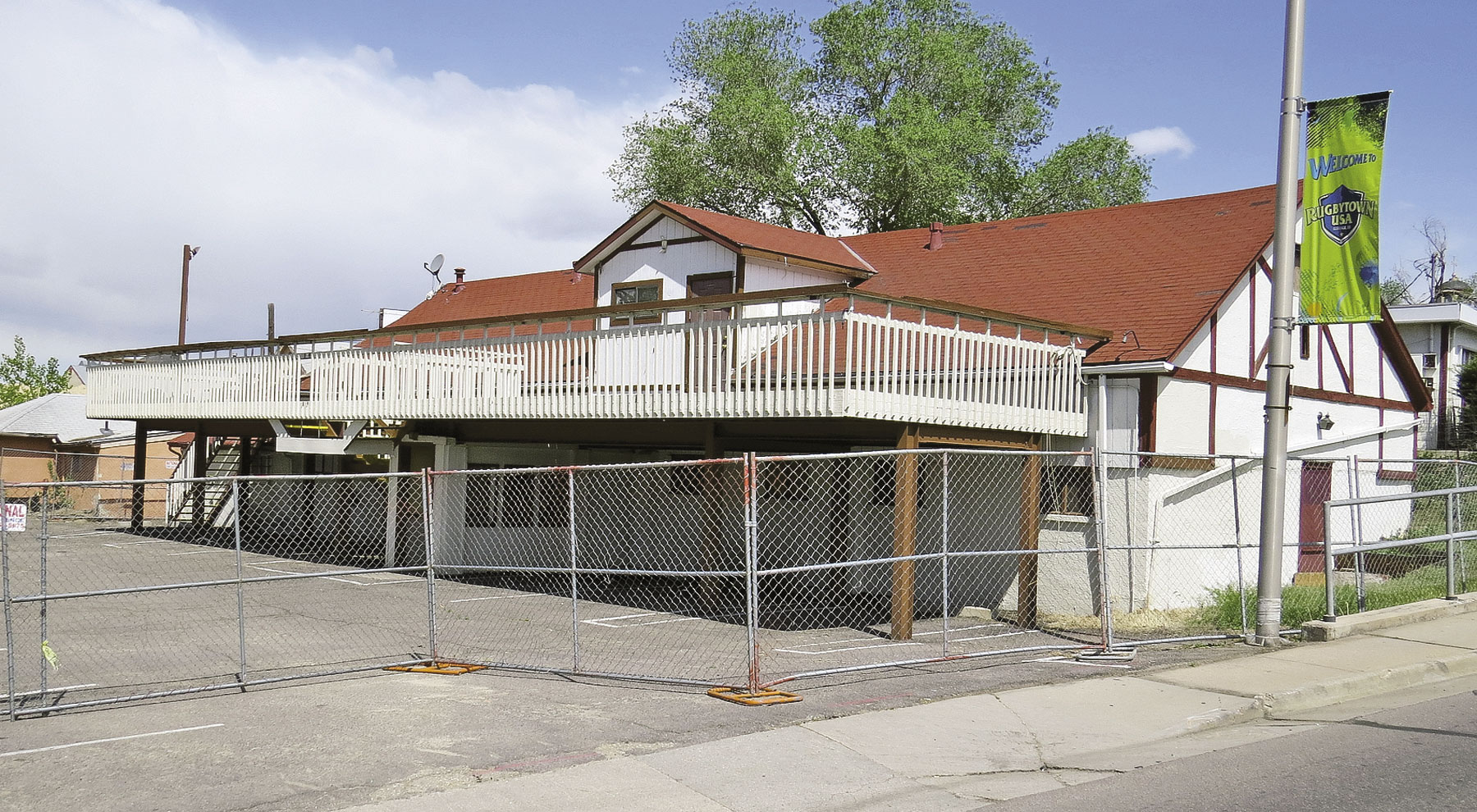
by Mark Smiley | May 27, 2014 | General Featured
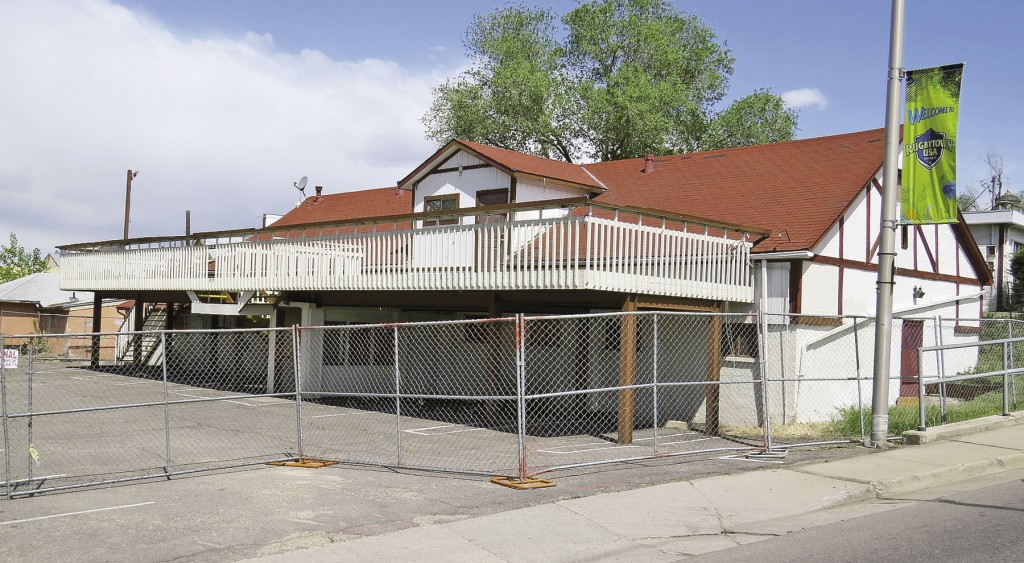 by Keith Thompson
by Keith Thompson
Glendale is one of the oldest towns in Colorado formed in 1859 with the building of what is now called Four Mile House by the Bratner brothers who sought to provide meat and produce to the just established city of Denver. The building became known as Four Mile House in the 1860s as it was the last stop on the stagecoach route before Denver, and the house was located four miles from the stage terminus at Broadway and Colfax. Four Mile House is today a park located in both Glendale and Denver.
Rite Aid, the third largest drugstore chain in the United States, is in the process of bulldozing two of the most historic buildings remaining in Glendale to put up a drugstore.
On the chopping block is the 4500 block of Leetsdale Drive just west of South Cherry Street that contains two of the four single family homes in Glendale, and the historic Chicago Dairy barn that, since 1967, housed the oldest sports bar in Denver, Four Mile Bar.
Rite Aid’s History
Rite Aid was founded in 1962 by Alex Grass with the first store called Thrift D Discount Center. In 1968, the name officially changed to Rite Aid Corporation and they made their first public offering and started trading on the American Stock Exchange.
In 2004, Rite Aid’s CEO Martin Glass (son of the founder) was sent to federal prison along with other Rite Aid executives for accounting fraud relating to the company. The company also agreed to pay $7 million to settle allegations that it had engaged in submitting false prescription claims to the federal government relating to United States health insurance programs.
Martin Grass was released from federal prison on January 18, 2010. Founder Alex Grass died of cancer on August 27, 2009.
Historic Glendale
Long before Glendale became Rugbytown USA it was known as Cowtown for the extraordinary number of dairies within the community. At the entrance to the town was a sign on a gas station that declared “Welcome to Cowtown — Where the West Remains.” Among the houses to be bulldozed is the one built by Agnes Riddle, a German dairywoman who was the first female state senator in Colorado. She is also credited for coming up with the name Glendale for the town. Glendale’s prior Recreation Center was named in honor of her. The house sits directly across Leetsdale Drive from the old Glendale Grange building that was built in 1897 and now is a commercial property.
In addition to destroying the Agnes Riddle home the development of the area will also scrap the former Four Mile Bar. The bar was located in a historic barn of the Chicago Dairy founded in the late 19th century by Harvey Sender and built by C. W. Snyder. It was purchased in 1903 by Lee Gasier.
The Chicago Dairy was closed down in 1967 and the old barn was converted into one of Denver’s first sports bars — Four Mile Bar. It was operated by Jack Casey for the next 46 years as a bar until last year when repeated liquor license violations forced the city to revoke the establishment’s liquor license and the property was put up for sale.
The Rite Aid Look
Rite Aid’s at times imperfect reputation extends to the physical look of its stores. “drugstores have never been known for their beauty,” stated John Gay, downtown resident. “But Rite Aid seems to some at times to have almost an intentionally shabby quality to them. Just look at their stores around Denver including the one at University Hills South Shopping Center on Colorado Boulevard. Their seedy look makes you assume that the prices must be rock bottom whether they are or not.”
On the remaining undeveloped ground it has been suggested that a bank might locate on the property. But Gay states, “I don’t see a bank wanting to house next to a Rite Aid. Perhaps a pawn shop or a payday loan operation might be a lot more synergistic.”
After the destruction of the Riddle home and the old Chicago Dairy structure, historic Glendale structures within the city limits are limited to the old Glendale Grange and the manor home of the Cambridge Dairy which was originally located on Colorado Boulevard and Cherry Creek Drive South. When that property was developed in the 1960s the manor home was moved to South Dexter near the Bull & Bush Pub and Brewery.
Few experts believe that the city of Glendale could have done anything to save the historic buildings even if it wanted to. “The property owner gets to develop his property any way he wants within certain parameters and Glendale is in general a fairly libertarian city,” states John Gay. “A drugstore is clearly a legal use. If Leetsdale Drive is now going to be a denser, uglier place what do you think is happening in the Denver portion of that roadway? It’s a brave new world and that is just the way things are today in the area.”
Rite Aid is projected to open in Glendale sometime in 2015.
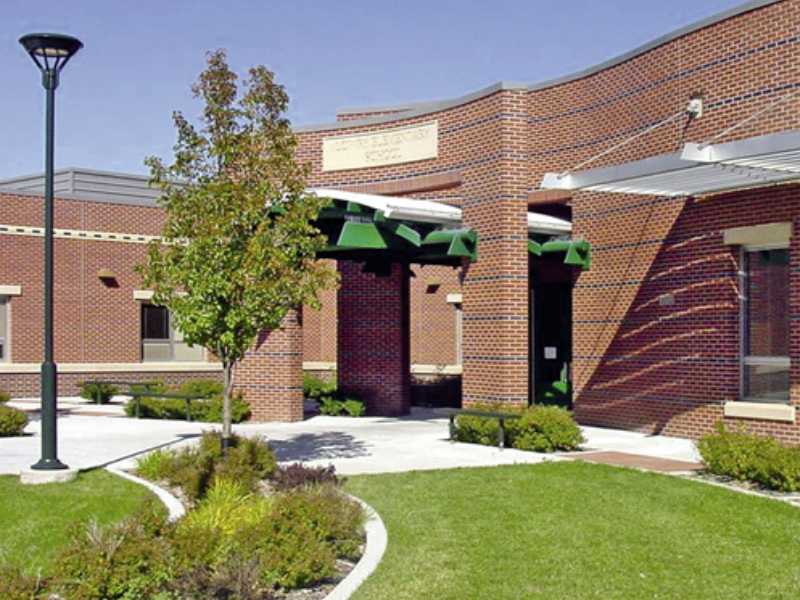
by Mark Smiley | Dec 5, 2012 | Featured Articles, General Featured
Denver Public Schools’ Minor Boundary …

 l from home raw and uncut fresh fruit, vegetables and herbs that were grown by the seller either on site or in a community garden.
l from home raw and uncut fresh fruit, vegetables and herbs that were grown by the seller either on site or in a community garden.





 email divulging that he had scampered past 180 others and had made it to the second round. “I am so excited. I had to submit a 5-10 minute video to them by June 13. If the producers of the show like it, I’ll be invited to come and pitch to the Sharks for real,” he tells the Chronicle.
email divulging that he had scampered past 180 others and had made it to the second round. “I am so excited. I had to submit a 5-10 minute video to them by June 13. If the producers of the show like it, I’ll be invited to come and pitch to the Sharks for real,” he tells the Chronicle.
 r more. Western Development is also in the process of building and developing 250 Columbine, a $100 million mixed use project and also in Cherry Creek North. Western Development will construct a seven story building that will have 71 luxury high end residences as well as retail stores on the ground level.
r more. Western Development is also in the process of building and developing 250 Columbine, a $100 million mixed use project and also in Cherry Creek North. Western Development will construct a seven story building that will have 71 luxury high end residences as well as retail stores on the ground level.

